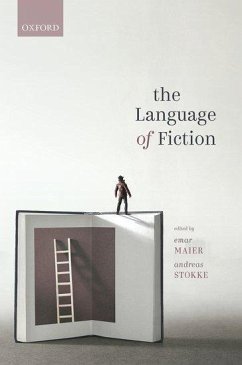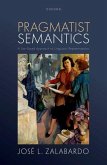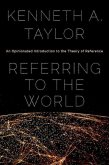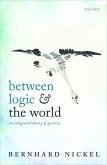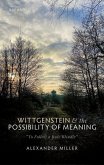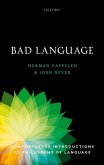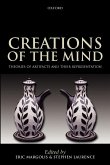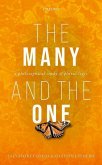The Language of Fiction
Herausgeber: Maier, Emar; Stokke, Andreas
The Language of Fiction
Herausgeber: Maier, Emar; Stokke, Andreas
- Gebundenes Buch
- Merkliste
- Auf die Merkliste
- Bewerten Bewerten
- Teilen
- Produkt teilen
- Produkterinnerung
- Produkterinnerung
This volume brings together new research on fiction from the fields of philosophy and linguistics. Following a detailed introduction to the field, the book's 14 chapters examine long-standing issues in fiction research from a perspective that is informed both by philosophy and linguistic theory.
Andere Kunden interessierten sich auch für
![Pragmatist Semantics Pragmatist Semantics]() José L ZalabardoPragmatist Semantics84,99 €
José L ZalabardoPragmatist Semantics84,99 €![Referring to the World Referring to the World]() Kenneth A TaylorReferring to the World102,99 €
Kenneth A TaylorReferring to the World102,99 €![Between Logic and the World Between Logic and the World]() Bernhard NickelBetween Logic and the World111,99 €
Bernhard NickelBetween Logic and the World111,99 €![Wittgenstein and the Possibility of Meaning Wittgenstein and the Possibility of Meaning]() Alexander MillerWittgenstein and the Possibility of Meaning95,99 €
Alexander MillerWittgenstein and the Possibility of Meaning95,99 €![Bad Language Bad Language]() Herman CappelenBad Language126,99 €
Herman CappelenBad Language126,99 €![Creations of the Mind Creations of the Mind]() Eric Margolis / Stephen Laurence (eds.)Creations of the Mind60,99 €
Eric Margolis / Stephen Laurence (eds.)Creations of the Mind60,99 €![The Many and the One The Many and the One]() Salvatore FlorioThe Many and the One100,99 €
Salvatore FlorioThe Many and the One100,99 €-
-
-
This volume brings together new research on fiction from the fields of philosophy and linguistics. Following a detailed introduction to the field, the book's 14 chapters examine long-standing issues in fiction research from a perspective that is informed both by philosophy and linguistic theory.
Hinweis: Dieser Artikel kann nur an eine deutsche Lieferadresse ausgeliefert werden.
Hinweis: Dieser Artikel kann nur an eine deutsche Lieferadresse ausgeliefert werden.
Produktdetails
- Produktdetails
- Verlag: Oxford University Press
- Seitenzahl: 418
- Erscheinungstermin: 28. Januar 2022
- Englisch
- Abmessung: 241mm x 164mm x 28mm
- Gewicht: 794g
- ISBN-13: 9780198846376
- ISBN-10: 0198846371
- Artikelnr.: 61862019
- Herstellerkennzeichnung
- Libri GmbH
- Europaallee 1
- 36244 Bad Hersfeld
- gpsr@libri.de
- Verlag: Oxford University Press
- Seitenzahl: 418
- Erscheinungstermin: 28. Januar 2022
- Englisch
- Abmessung: 241mm x 164mm x 28mm
- Gewicht: 794g
- ISBN-13: 9780198846376
- ISBN-10: 0198846371
- Artikelnr.: 61862019
- Herstellerkennzeichnung
- Libri GmbH
- Europaallee 1
- 36244 Bad Hersfeld
- gpsr@libri.de
Emar Maier is an assistant professor at the University of Groningen, affiliated with both the Philosophy and Linguistics Departments. After receiving his PhD in Philosophy from the University of Nijmegen in 2006, he led an ERC Starting Grant project (2011-2016) on quotation. He is currently leading an NWO VIDI project, investigating the semantics of imagination and fiction, combining topics and insights from philosophy (e.g. mental files, imaginative resistance) and linguistics (e.g. dynamic semantics). His research interests include fiction and imagination; pictorial semantics and 'superlinguistics'; attitude ascription and quotation; and reference and indexicality Andreas Stokke is a docent and senior lecturer in Philosophy at the Department of Philosophy, Uppsala University, and a Pro Futura Scientia Fellow at the Swedish Collegium for Advanced Study. He has previously held positions at New York University and the University of Oxford. His research is mainly in the fields of philosophy of language and epistemology, but he has also worked on ethics and the philosophy of action. He has published extensively on topics including lying and insincerity, protagonist projection, and dynamic semantics, and he is the author of the OUP volumes Lying and Insincerity (2018) and Lying: Language, Knowledge, Ethics, and Politics (co-edited with Eliot Michaelson; 2018).
* 1: Emar Maier and Andreas Stokke: Introduction
* Part I: Truth, Reference, and Imagination
* 2: François Recanati: Fictional reference as simulation
* 3: Hans Kamp: Sharing real and fictional reference
* 4: Nils Franzén: Fictional truth: In defense of the reality principle
* 5: Sandro Zucchi: On the generation of content
* 6: Manuel García-Carpintero: Do the imaginings that fictions invite
have a direction of fit?
* Part II: Storytelling
* 7: Regine Eckardt: In search of the narrator
* 8: Emar Maier and Merel Semeijn: Extracting fictional truth from
unreliable sources
* 9: Samuel Cumming: Narrative and point-of-view
* 10: Daniel Altshuler: A puzzle about narrative progression and causal
reasoning
* 11: Matthias Bauer and Sigrid Beck: Isomorphic mapping in fictional
interpretation
* Part III: Perspective Shift
* 12: Nellie Wieland: Metalinguistic acts in fiction
* 13: Márta Abrusán: Computing perspective shift in narratives
* 14: Isidora Stojanovic: Derogatory terms in free indirect discourse
* 15: Andreas Stokke: Protagonist projection, character-focus, and
mixed quotation
* Part I: Truth, Reference, and Imagination
* 2: François Recanati: Fictional reference as simulation
* 3: Hans Kamp: Sharing real and fictional reference
* 4: Nils Franzén: Fictional truth: In defense of the reality principle
* 5: Sandro Zucchi: On the generation of content
* 6: Manuel García-Carpintero: Do the imaginings that fictions invite
have a direction of fit?
* Part II: Storytelling
* 7: Regine Eckardt: In search of the narrator
* 8: Emar Maier and Merel Semeijn: Extracting fictional truth from
unreliable sources
* 9: Samuel Cumming: Narrative and point-of-view
* 10: Daniel Altshuler: A puzzle about narrative progression and causal
reasoning
* 11: Matthias Bauer and Sigrid Beck: Isomorphic mapping in fictional
interpretation
* Part III: Perspective Shift
* 12: Nellie Wieland: Metalinguistic acts in fiction
* 13: Márta Abrusán: Computing perspective shift in narratives
* 14: Isidora Stojanovic: Derogatory terms in free indirect discourse
* 15: Andreas Stokke: Protagonist projection, character-focus, and
mixed quotation
* 1: Emar Maier and Andreas Stokke: Introduction
* Part I: Truth, Reference, and Imagination
* 2: François Recanati: Fictional reference as simulation
* 3: Hans Kamp: Sharing real and fictional reference
* 4: Nils Franzén: Fictional truth: In defense of the reality principle
* 5: Sandro Zucchi: On the generation of content
* 6: Manuel García-Carpintero: Do the imaginings that fictions invite
have a direction of fit?
* Part II: Storytelling
* 7: Regine Eckardt: In search of the narrator
* 8: Emar Maier and Merel Semeijn: Extracting fictional truth from
unreliable sources
* 9: Samuel Cumming: Narrative and point-of-view
* 10: Daniel Altshuler: A puzzle about narrative progression and causal
reasoning
* 11: Matthias Bauer and Sigrid Beck: Isomorphic mapping in fictional
interpretation
* Part III: Perspective Shift
* 12: Nellie Wieland: Metalinguistic acts in fiction
* 13: Márta Abrusán: Computing perspective shift in narratives
* 14: Isidora Stojanovic: Derogatory terms in free indirect discourse
* 15: Andreas Stokke: Protagonist projection, character-focus, and
mixed quotation
* Part I: Truth, Reference, and Imagination
* 2: François Recanati: Fictional reference as simulation
* 3: Hans Kamp: Sharing real and fictional reference
* 4: Nils Franzén: Fictional truth: In defense of the reality principle
* 5: Sandro Zucchi: On the generation of content
* 6: Manuel García-Carpintero: Do the imaginings that fictions invite
have a direction of fit?
* Part II: Storytelling
* 7: Regine Eckardt: In search of the narrator
* 8: Emar Maier and Merel Semeijn: Extracting fictional truth from
unreliable sources
* 9: Samuel Cumming: Narrative and point-of-view
* 10: Daniel Altshuler: A puzzle about narrative progression and causal
reasoning
* 11: Matthias Bauer and Sigrid Beck: Isomorphic mapping in fictional
interpretation
* Part III: Perspective Shift
* 12: Nellie Wieland: Metalinguistic acts in fiction
* 13: Márta Abrusán: Computing perspective shift in narratives
* 14: Isidora Stojanovic: Derogatory terms in free indirect discourse
* 15: Andreas Stokke: Protagonist projection, character-focus, and
mixed quotation

